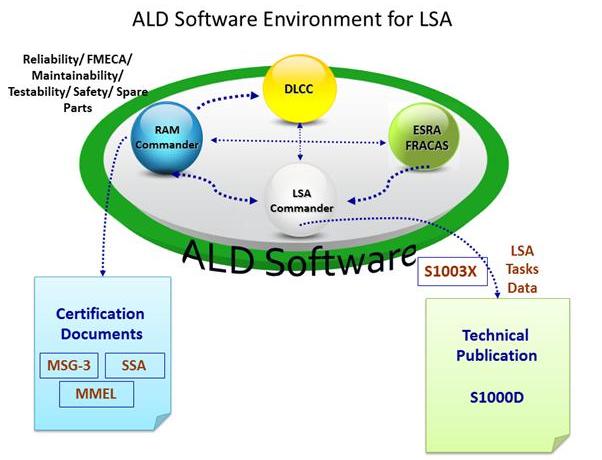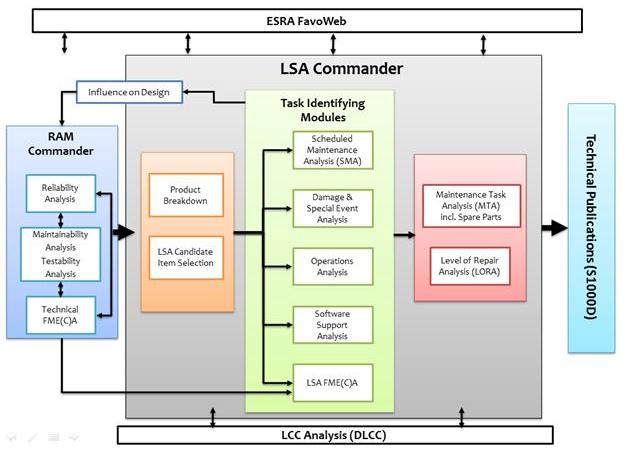Logistics Support Analysis (LSA), sometimes also called Maintenance Engineering Analysis (MEA), is a methodology that supports the logistics needs of a complex system throughout its life cycle. Through the structured approach of LSA, all aspects of Integrated Logistics Support (ILS) are planned in advance. As a result, the efficiency of maintenance increases and cost of logistics support is significantly reduced. A successful LSA allows identifiying requirements to maintenance and logistics support of a complex system throughout its life cycle, early enough to impact the system design.
LSA establishes a core basis of ILS, ensuring open exchange of information between design and logistics of any complex system.
LSA establishes a core basis of ILS, ensuring open exchange of information between design and logistics of any complex system.
Main goals of LSA for an aircraft, as an example of a complex system:
1. Design for aircraft support: design with focus on minimizing the number of operations, maintenance, training, support tasks and life-cycle-cost while optimizing operational readiness/ airworthiness/ dispatch reliability.
2. Design of aircraft support: design, funding, test, and acquisition of all required resources for the assurance of aircraft readiness/ airworthiness/ dispatch reliability.
LSA Commander is the latest addition to the family of ALD Software: RAM Commander, D-LCC, and ESRA FRACAS. LSA Commander unites all ILS and LSA modules and features previously supported by the indicated various ALD Software tools.
The main goal of LSA Commander is to implement and adapt the entire scope of the LSA’s latest ASD S3000L standard. By implementing ASD S3000L, LSA Commander allows closure of the gap between the design of an aircraft and the ILS activities, which play a crucial role in the development of an efficient maintenance program – one of the most important elements of the aircraft’s after sale support. Aircraft dispatch reliability; cost-effectiveness and safety are the outcomes of a well-developed LSA concept.
LSA Commander makes it easier to manage and perform the complex LSA tasks, such as logistics FME(C)A, MTA, LORA, etc., and provides the information needed to influence the design at an early stage, thus reducing maintenance and operational costs and minimizing the total ownership cost.
LSA Commander is a comprehensive platform that facilitates all LSA activities performed throughout the aircraft’s life cycle, in accordance with ASD S3000L standard. It also supports the LSA tasks required by the older standards: GEIA-0007, Def Stan 00-60, and MIL-STD-1388-1A.
LSA Commander is a platform intended for both actual analysis work together with management of all LSA tasks and activities, data flow between them and monitoring of the overall status, to ensure effective and efficient maintenance.
LSA Commander Database collects all the data produced throughout the different analyses and tasks and then provides input for production of technical publications.
LSA Commander Software Environment
LSA Commander uses the outputs from and provides inputs for other ALD’s other software tools (RAM Commander, ESRA and D-LCC), together creating a package that covers all aspects of RAMS and LSA of any complex system throughout its life cycle.

LSA Commander Main Modules
The picture below presents the tasks supported by the LSA Commander Modules and functions. It also shows the data flow between RAM Commander, ESRA FRACAS, D-LCC, and Technical Publications (TP) Software.

LSA Commander Technical Features
• LSA Commander incorporates Oracle Data Base
• LSA Commander is a web based application that can be used within the organization (intranet) or between several organizations across the world (internet)
• LSA Commander provides a flexible platform which allows for quick modifications according to analysis needs
• LSA Commander Dynamic Reports/ Export Module supports necessary data output formats
• LSA Commander Work flow/ Notifications/ Alerts Modules are tools for analysis process management
• LSA Commander facilitates navigation and browsing of LSA data
• LSA Commander allows easy sharing of LSA information across the organization
